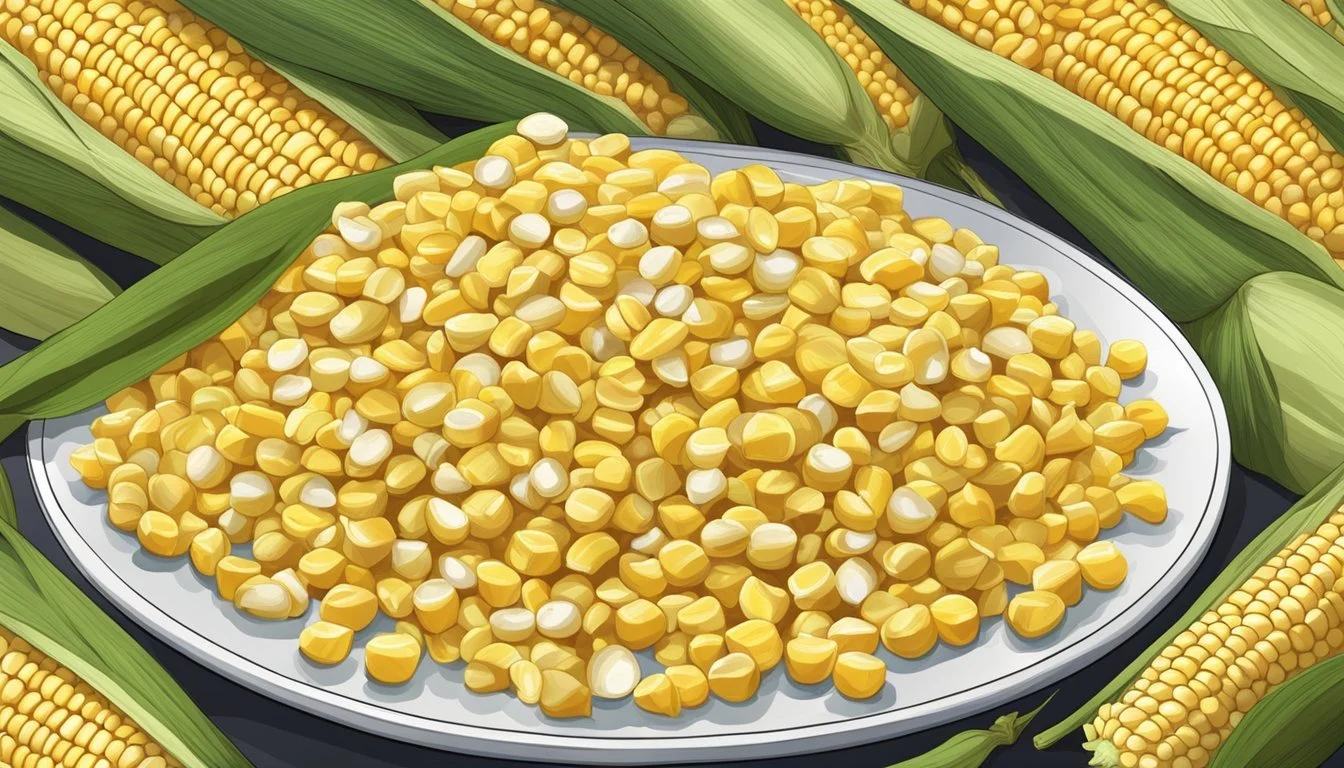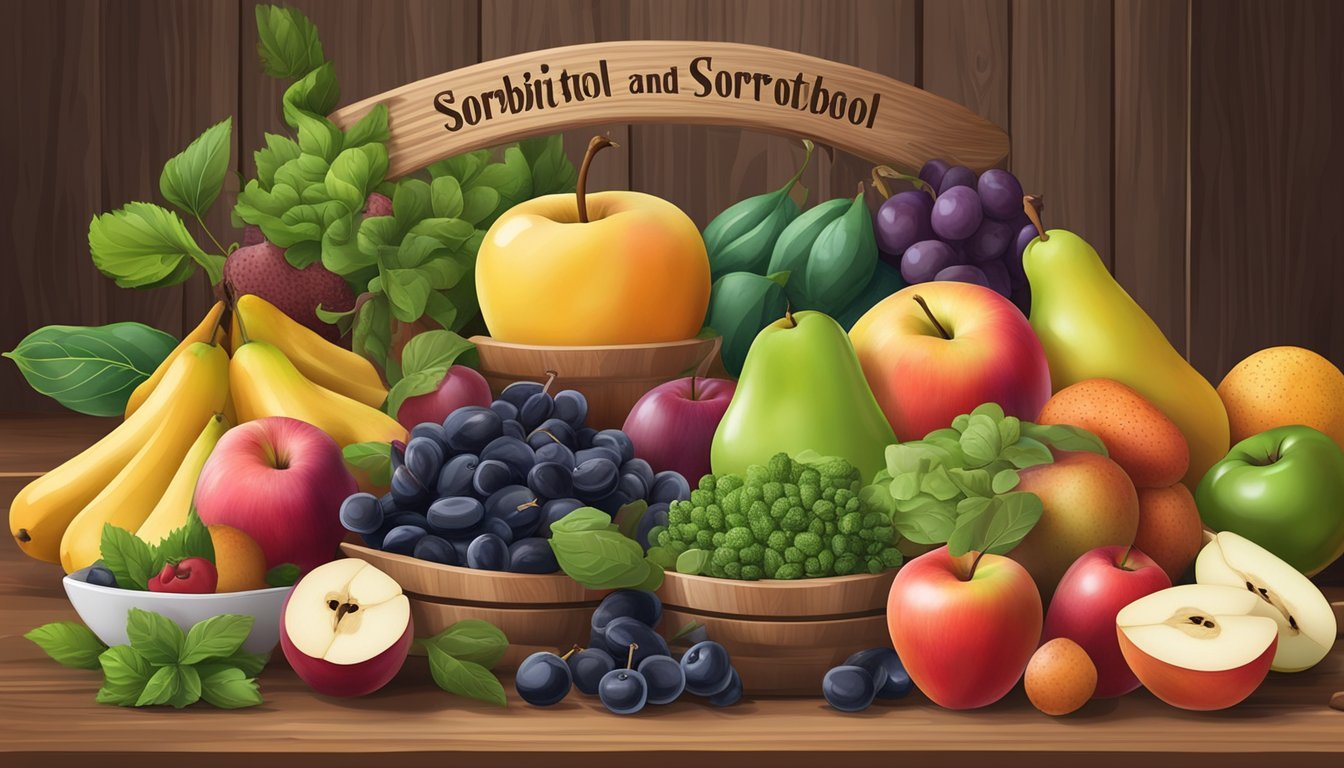Navigating Sorbitol-Rich Foods
Dietary Sources and Health Benefits
Sorbitol, a naturally occurring sugar alcohol, is found in a wide variety of foods we consume daily. It is particularly prevalent in fruits, some vegetables, and a range of processed products. Due to its laxative properties, it's essential for those sensitive to it to be aware of its presence in their diet.
Understanding which foods contain high levels of sorbitol and how it affects the body can be crucial for managing digestive health. This article aims to shed light on the foods rich in sorbitol and provide insights into how they may impact certain individuals, particularly those with irritable bowel syndrome (IBS) or sorbitol intolerance.
1) Blackberries
Blackberries are a popular fruit rich in nutrients, including vitamin C, vitamin K, and dietary fiber. They are known for their deep purple color and sweet-tart flavor.
One important aspect of blackberries is their sorbitol content. Sorbitol is a sugar alcohol that naturally occurs in blackberries. For some individuals, particularly those with irritable bowel syndrome (IBS), consuming foods high in sorbitol can lead to digestive discomfort.
Blackberries contain both soluble and insoluble fibers. Insoluble fiber aids in preventing constipation by speeding up the passage of food through the gut. Soluble fiber, on the other hand, helps feed beneficial gut bacteria and draws water into the gut, which can support digestive health.
The presence of sorbitol in blackberries makes them a high FODMAP food. People on a low FODMAP diet may need to limit their intake to avoid gastrointestinal issues such as bloating and gas. For others, blackberries can be a nutritious addition to the diet, providing essential vitamins and fibers.
2) Avocados
Avocados are a well-known source of nutrients and healthy fats. However, they also contain sorbitol, a type of sugar alcohol classified as a FODMAP (fermentable oligosaccharides, disaccharides, monosaccharides, and polyols).
Sorbitol can trigger digestive discomfort in some individuals, particularly those with irritable bowel syndrome (IBS).
The sorbitol content in avocados varies depending on portion size. A full half of an avocado (approximately 2.8 ounces) is high in FODMAPs. Conversely, a smaller portion such as an eighth of an avocado (about 1.1 ounces) is considered low in FODMAPs, making it more tolerable for those sensitive to sorbitol.
People's tolerance to sorbitol can differ. Some may experience symptoms even with small amounts, while others might handle larger portions without issue.
Though avocado is nutritious, individuals with sorbitol sensitivity or IBS should be mindful of their intake. Consuming smaller portions might help mitigate adverse effects and still provide nutritional benefits.
Careful portion control can help individuals enjoy avocados without triggering digestive problems. Monitoring reactions can guide better dietary choices for those affected by sorbitol.
3) Cherries
Cherries are commonly known for their vibrant color and sweet taste. They are rich in essential nutrients like vitamins A and C, potassium, and fiber.
However, cherries also contain significant amounts of sorbitol and fructose. Sorbitol is a type of sugar alcohol that can cause digestive issues in some people.
Individuals with irritable bowel syndrome (IBS) or other gastrointestinal conditions may experience discomfort after consuming cherries. This can include symptoms like gas, bloating, and diarrhea.
For those on a low FODMAP diet, cherries are typically not recommended. A small portion of about 2 cherries may be considered low FODMAP, but larger quantities can trigger symptoms.
Despite their potential to cause digestive discomfort, cherries are still enjoyed by many. Careful portion control can help mitigate some of the adverse effects associated with their sorbitol content.
4) Peaches
Peaches are a common source of sorbitol, a type of sugar alcohol that naturally occurs in various fruits.
In peaches, sorbitol is present alongside other FODMAPs such as fructose. These compounds can be problematic for individuals with irritable bowel syndrome (IBS) as they may cause digestive discomfort.
Even a medium peach can contain enough sorbitol to trigger symptoms in sensitive individuals.
The consumption of peaches should be monitored, especially for those known to have sorbitol intolerance or IBS.
Despite the potential for digestive issues, peaches remain a nutritious fruit, offering vitamins and antioxidants. It's the specific impact of sorbitol that needs attention for those with dietary restrictions.
5) Plums
Plums are known for their juicy sweetness and versatile use in cooking and baking. They are naturally high in sorbitol, a type of sugar alcohol.
For those managing sorbitol intake, plums can be a concern. Sorbitol, when consumed in large amounts, may cause digestive discomfort. This includes symptoms like gas and bloating.
The presence of sorbitol in plums links them to high FODMAP foods. These foods are often avoided by people with irritable bowel syndrome (IBS) and other digestive issues.
Sorbitol occurs naturally in the flesh of the fruit. It can also be found in high quantities in dried plums or prunes.
People with diabetes may find plums a better sweetening option than regular sugar. Sorbitol has a lower impact on blood sugar levels. Yet, it's important to note that moderation is key, due to the potential for digestive upset.
Fresh, ripe plums offer vitamins and antioxidants along with their sweetness. They are a healthy option when eaten in controlled portions.
6) Apples
Apples are a well-known source of sorbitol, a type of sugar alcohol. This naturally occurring compound can be found in significant amounts in various apple varieties.
For individuals with irritable bowel syndrome (IBS), consuming apples may trigger digestive issues. One medium apple can contain enough sorbitol to provoke symptoms like gas, bloating, and discomfort.
Sorbitol's presence makes apples a high-FODMAP food. People sensitive to sorbitol should monitor their intake to avoid adverse reactions. Despite these concerns, apples offer nutritional benefits such as fiber and vitamins when consumed in moderation.
Cooking or processing apples does not significantly reduce their sorbitol content. Therefore, both raw and cooked apples need to be approached with caution by those affected.
Alternative fruits with lower sorbitol content may be better options for sensitive individuals.
7) Pears
Pears are a common source of sorbitol, a type of sugar alcohol. This sugar naturally occurs in both fresh and dried varieties of pears. Fresh pears contain significant amounts of sorbitol, which can be problematic for those with sorbitol intolerance or those following a low FODMAP diet.
Packham pears, specifically, are noted for their high fructose and sorbitol content. A medium-sized Packham pear with the skin on is not suitable for low FODMAP diets due to these high levels. However, peeling the pear can reduce the sorbitol content, making it more manageable in smaller quantities.
Dried pears have even higher concentrations of sorbitol compared to their fresh counterparts. This increase in sugar alcohol content intensifies as the fruit loses water during the drying process, making dried pears a more potent source of sorbitol.
The consumption of sorbitol from pears can lead to gastrointestinal issues such as gas and bloating, especially for individuals with irritable bowel syndrome (IBS). It is advisable for these individuals to monitor their intake of both fresh and dried pears to avoid discomfort.
8) Cauliflower
Cauliflower is a versatile vegetable enjoyed in various cuisines. Although it is a healthy food choice, it contains sorbitol, a type of sugar alcohol. Sorbitol contributes to its slightly sweet taste.
For those sensitive to high FODMAP foods, consuming cauliflower can lead to digestive issues. This is particularly true for individuals with irritable bowel syndrome (IBS).
Moderation is key when incorporating cauliflower into a diet. Small servings may be tolerable for some people. For those experiencing discomfort, it might be beneficial to opt for lower FODMAP vegetable alternatives. Consulting with a dietitian can provide personalized guidance.
9) Sweet Corn
Sweet corn is a common source of sorbitol. Sorbitol is a sugar alcohol found naturally in many foods, including sweet corn.
Even though sweet corn is high in sorbitol, it is still enjoyed in many cuisines worldwide. The sorbitol content in sweet corn can cause digestive issues for some individuals, particularly those with irritable bowel syndrome (IBS).
It's important to note that while sweet corn is a high-FODMAP food, it can still be included in a low-FODMAP diet in small quantities. For example, a portion size of up to 38 grams can be tolerated by some.
Sweet corn features in various dishes, from salads to soups, providing a sweet, crisp texture. It's often found in canned form, which can be convenient but may also contain other FODMAPs depending on the preparation and additives.
Those who are sensitive to sorbitol should monitor their intake of sweet corn to avoid gastrointestinal discomfort. Caution and portion control can help manage symptoms while enjoying this versatile vegetable.
10) Dried Apricots
Dried apricots are notable for their high sorbitol content. Sorbitol is a type of sugar alcohol that occurs naturally in various fruits, including apricots. For people sensitive to FODMAPs, consuming dried apricots might result in gastrointestinal discomfort.
In addition to sorbitol, dried apricots are rich in other nutrients. They provide a significant amount of vitamin A, mainly in the form of beta-carotene. A 30-gram serving of dried apricots can offer up to 6% of the daily value for vitamin A.
The natural sugars and fibers in dried apricots contribute to their sweet taste and chewy texture. They are often used in baking, cooking, or as a standalone snack. Despite their benefits, individuals with irritable bowel syndrome or other digestive issues should consume them in moderation.
Dried apricots are a convenient and portable snack. However, it's crucial to consider their sorbitol content if one is managing dietary triggers. They can be part of a balanced diet if eaten thoughtfully.
What Is Sorbitol?
Sorbitol is a type of carbohydrate that belongs to a class of sugar alcohols known as polyols. It offers specific chemical properties and has various uses in both the food industry and medicine.
Chemical Structure and Properties
Sorbitol, also known as D-sorbitol or D-glucitol, is a polyol with the chemical formula C6H14O6. It has a molecular structure similar to glucose but with an additional hydroxyl group, making it a sugar alcohol.
This compound is water-soluble and typically appears as a white, crystalline powder.
The glycemic index (GI) of sorbitol is quite low at 9, meaning it has a minimal impact on blood sugar levels compared to glucose, which has a GI of 100. This property makes it suitable for use in diabetes-friendly products.
Common Uses in Food and Medicine
In the food industry, sorbitol is utilized as a low-calorie sweetener, humectant, and texturizer. It is about 60% as sweet as sucrose and is found in products like sugar-free gum, candies, and desserts. Sorbitol also serves as an additive (E420) in various processed foods.
In medicine, sorbitol is used as a laxative due to its ability to draw water into the large intestine, aiding bowel movement. It is also included in some cough syrups and oral care products like toothpaste, where it acts as a sweetening agent.
Beyond these uses, sorbitol's low glycemic index and water retention properties are critical advantages in both food and pharmaceutical applications.
Health Benefits of Sorbitol
Sorbitol offers notable health benefits, including a low glycemic index that makes it suitable for people managing blood sugar levels and dental benefits that help maintain oral health.
Low Glycemic Index
Sorbitol features a glycemic index of 9, which is considerably low compared to regular sugar. This characteristic makes it a beneficial sweetener for individuals who need to monitor their blood glucose levels, such as those with diabetes.
It results in a smaller rise in blood glucose and insulin levels, which can help maintain better glycemic control.
Furthermore, because it metabolizes more slowly than glucose, sorbitol provides a more gradual release of energy. This can be particularly advantageous for people looking to avoid the rapid spikes and crashes associated with high glycemic foods.
Dental Health Benefits
Sorbitol is less likely to contribute to tooth decay compared to regular sugars. This is because it is not fermented by oral bacteria to the same extent, reducing the production of acids that erode dental enamel.
Its use in sugar-free gum and candies underscores its role in promoting better oral hygiene.
It can help in reducing the incidence of cavities and other dental issues. Incorporating sorbitol into the diet as a sweetening alternative can support better dental health practices, contributing to fewer visits to the dentist and lower dental care costs.
Potential Side Effects
Consuming high amounts of sorbitol can lead to digestive discomfort, particularly for those with specific sensitivities. Additionally, there are concerns regarding allergic reactions, though these are less common.
Digestive Issues
Sorbitol is known to cause gastrointestinal distress in many individuals when consumed in large quantities. Symptoms can include bloating, gas, and diarrhea.
As a sugar alcohol, sorbitol is poorly absorbed in the small intestine and can ferment in the colon, leading to discomfort.
People with irritable bowel syndrome (IBS) or other gastrointestinal disorders might be particularly sensitive to sorbitol. It's essential for these individuals to monitor their intake and consider alternatives if they experience symptoms. Even otherwise healthy individuals might find that high-sorbitol foods cause unexpected digestive issues.
Allergic Reactions
Allergic reactions to sorbitol are uncommon but can occur. Symptoms may include skin rashes, itching, and swelling.
These reactions might complicate identifying the cause, as sorbitol is often found in processed foods alongside other common allergens. Detailed ingredient lists and proactive communication with healthcare providers are crucial for those who suspect an allergy.
If an allergic reaction is suspected, it is advisable to seek medical advice. Maintaining a food diary can help in identifying the offending ingredient and managing the sensitivity effectively. In rare cases, severe allergic reactions may require more immediate and intensive medical intervention.













